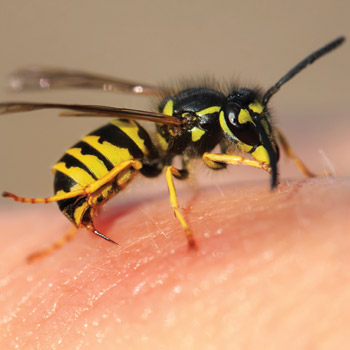Evidence shifting for cardiac drugs with insect allergies
The cardiovascular benefits of beta-blockers and angiotensin-converting enzyme (ACE) inhibitors must be weighed against anaphylaxis risk in patients with allergy.
Clinicians often advise patients with insect allergy to avoid beta-blockers and angiotensin-converting enzyme (ACE) inhibitors due to the potential for increased anaphylaxis risk. But new evidence may soon indicate a change in best practice, explained David BK Golden, MD, FACP.
In a session at the American Academy of Allergy, Asthma, & Immunology (AAAAI) Annual Meeting, held in Phoenix and virtually in February, he offered an update on the evolution of the available research on this topic.

Cardiovascular medications are thought to increase risk for anaphylaxis due to their mechanism of action, explained Dr. Golden, who is research faculty at Johns Hopkins University in Baltimore and chair of the AAAAI's Stinging Insect Hypersensitivity Practice Parameter Update Workgroup. Beta-blockers may reduce compensatory cardiovascular responses to anaphylaxis, may enhance the release of mast cell mediators, and may interfere with the beneficial effects of epinephrine, he said. Angiotensin blockers, meanwhile, prevent breakdown of bradykinin, may promote vasodilatation, and may have direct effects on mast cells.
Early warning signs regarding beta-blockers and anaphylaxis cropped up in the 1970s, Dr. Golden noted.
“Propranolol in particular came into increased use for cardiovascular disease,” he said. “It didn't take long for there to emerge scattered reports of anaphylaxis, severe and fatal anaphylaxis, for example, related to radiocontrast media, to insect stings, and noting the possibility of epinephrine-resistant anaphylaxis because of the interference of the beta-blocker with the beneficial effects of epinephrine.”
A review published in the Canadian Medical Association Journal in 1987 recommended that clinicians use skin testing and immunotherapy with great caution in patients taking beta-blockers, calling for alternative approaches when possible and alternative medications when appropriate, Dr. Golden noted.
After ACE inhibitors were introduced in the mid-1980s, “Again, it didn't take long for there to emerge scattered reports of anaphylactic reactions during venom immunotherapy and during apheresis with dextran sulfate,” he said. Other research found that the endogenous level of circulating serum ACE was lower in patients with severe anaphylaxis due to tree nuts and peanuts, particularly in those with pharyngeal edema, than in patients with no reaction or mild reaction.
“This supports the notion that any medication that would inhibit the action of angiotensin-converting enzyme would have a similar effect promoting the severity of anaphylaxis,” Dr. Golden said.
The cardiovascular benefits of beta-blockers and ACE inhibitors must be weighed against anaphylaxis risk in patients with allergy, he said. A decision analysis in patients with heart disease and peanut-induced anaphylaxis, published in the Journal of Allergy and Clinical Immunology in May 2004, assumed a greater risk for fatal anaphylaxis in those who took beta-blockers and for cardiac death in those who did not. The results indicated that life expectancy was better in the former group.
“This underscores the importance of the underlying cardiovascular disease more so than the medications,” Dr. Golden said.
Another concern is that use of beta-blockers and ACE inhibitors can cause treatment failure in patients with insect allergy who are receiving venom immunotherapy, he said. A study published in Clinical & Experimental Allergy in January 2014 found an increased risk of systemic reaction during treatment in patients who were taking ACE inhibitors.
“There were 30 patients who were taking ACE inhibitors at the time of sting challenge, of whom six, or 20%, had a systemic reaction to the sting, which was significantly greater than the reaction rate in patients not taking ACE inhibitors,” Dr. Golden said. None of the 18 patients taking beta-blockers and venom immunotherapy, meanwhile, had a systemic reaction.
A similar study, published in the Annals of Allergy, Asthma & Immunology in May 2015, had very different results. The authors looked at 225 patients, 31.6% who were taking an ACE inhibitor and 17.8% who were taking a beta-blocker. The mean reaction rate to stings during venom immunotherapy was 7.5%. While underlying cardiac disease and systemic reactions to venom immunotherapy injection were each associated with a higher frequency of systemic reactions to stings during treatment, the difference was not significant, and no increased frequency was seen in patients taking ACE inhibitors or beta-blockers.
“Based on these and other published reports that were available to the practice parameter workgroups, the [AAAAI's] practice parameter updates in 2015 and 2016 made no formal recommendations regarding beta-blockers and ACE inhibitors,” Dr. Golden said. The 2015 update did state that it is still appropriate to consider discontinuing drugs that may worsen an anaphylactic event or interfere with treatments, which might include beta-blockers, ACE inhibitors, and monoamine oxidase inhibitors.
Other guidance in the update included that clinicians should consider each patient's risk-benefit ratio, that the decision to discontinue beta-blockers and ACE inhibitors should be up to the allergist and other physicians on the patient's care team, and that the benefits of venom immunotherapy in particular clearly outweigh risks associated with beta-blockers in patients with confirmed anaphylaxis to stinging insects and in patients with cardiovascular disease who require uninterrupted treatment with beta-blockers, Dr. Golden said.
In March 2019, the first systematic review and meta-analysis of observational studies on anaphylaxis and the use of beta-blockers and ACE inhibitors was published in the Journal of Allergy and Clinical Immunology: In Practice, Dr. Golden said. It included 21 studies, nine that assessed the incidence of anaphylaxis and 15 that assessed its severity. The meta-analysis found that beta-blockers and ACE inhibitors increased the severity, but not the incidence, of anaphylaxis and that the quality of the evidence was low due to the heterogeneity of the included studies.
“They did note that the odds ratio for severe anaphylaxis was three times higher for underlying cardiovascular disease than for beta-blockers and five times higher for cardiovascular disease than for ACE inhibitors,” Dr. Golden said.
In even newer research, a large European group performed the first prospective study of the effects of beta-blockers and ACE inhibitors on the risk for severe systemic sting reactions during immunotherapy, which was published in Allergy in February 2021. They included 1,425 patients who were allergic to insect stings, 1,342 who went on to receive venom immunotherapy, and found no significantly increased risk of systemic reaction in patients taking beta-blockers and ACE inhibitors or in patients with underlying cardiovascular disease. In a retrospective analysis of the data, patients with underlying cardiovascular disease had a significantly increased risk for severe post-sting anaphylaxis before starting immunotherapy, but patients taking cardiac medications did not.
“So where does that leave us today?” Dr. Golden asked. He noted that a new focused practice parameter update from AAAAI is scheduled to be published later this year but offered his personal recommendations on best practice in the meantime for patients with known insect allergy.
“In my opinion, for initial immunotherapy, it is still appropriate to request prescriber review for possible substitution [of beta-blockers and ACE inhibitors] if there are equally safe and equally effective alternative medications,” he said.
He stressed, however, that cardiovascular risk exceeds the anaphylaxis risk of the medications. “This is an appropriate situation for shared decision making, incorporating the individual patient values and preferences,” he said. “For maintenance immunotherapy, there seems to be minimal risk of cardiovascular medications, and no change is required.”




